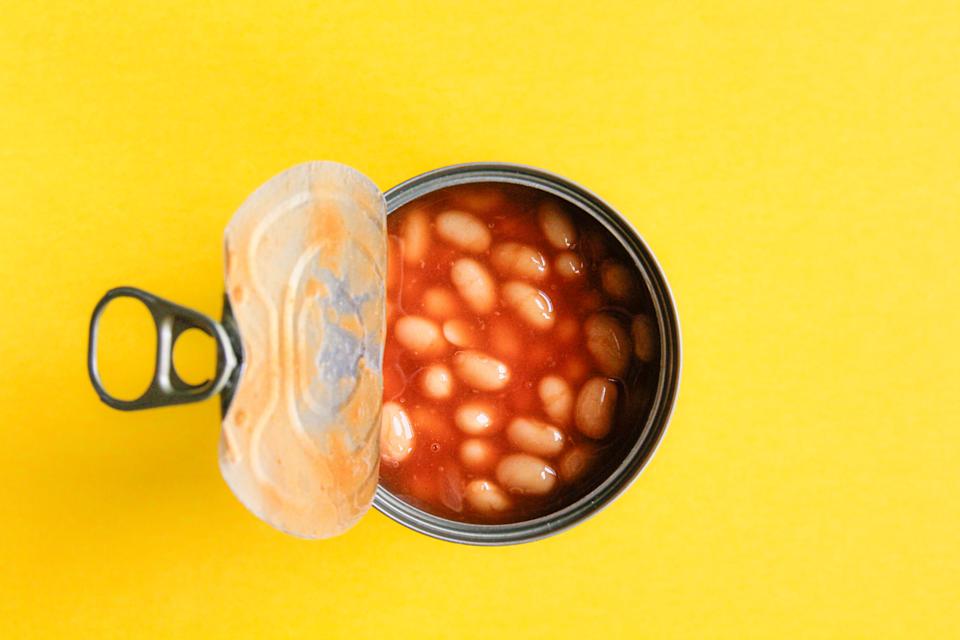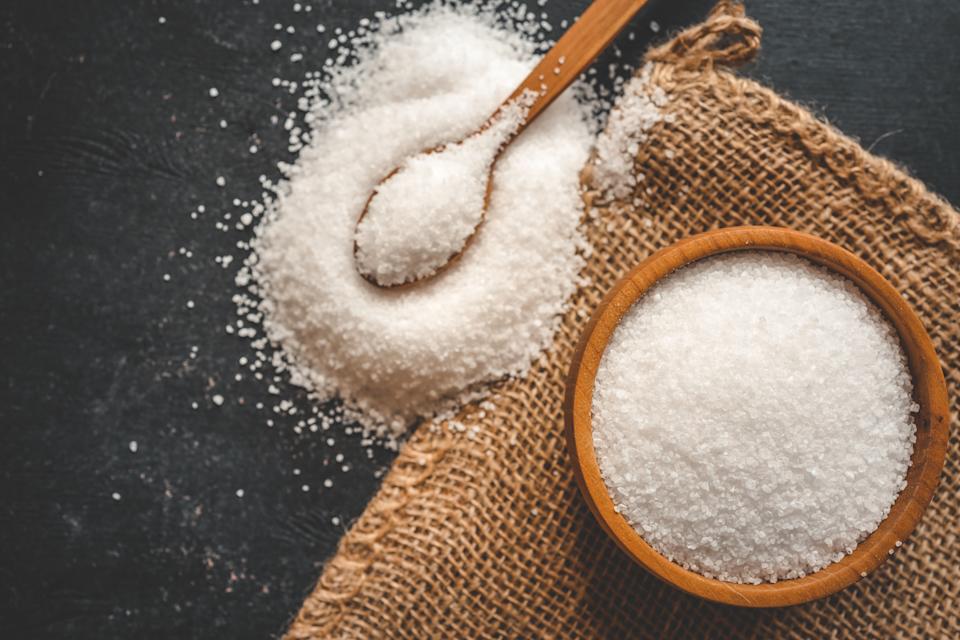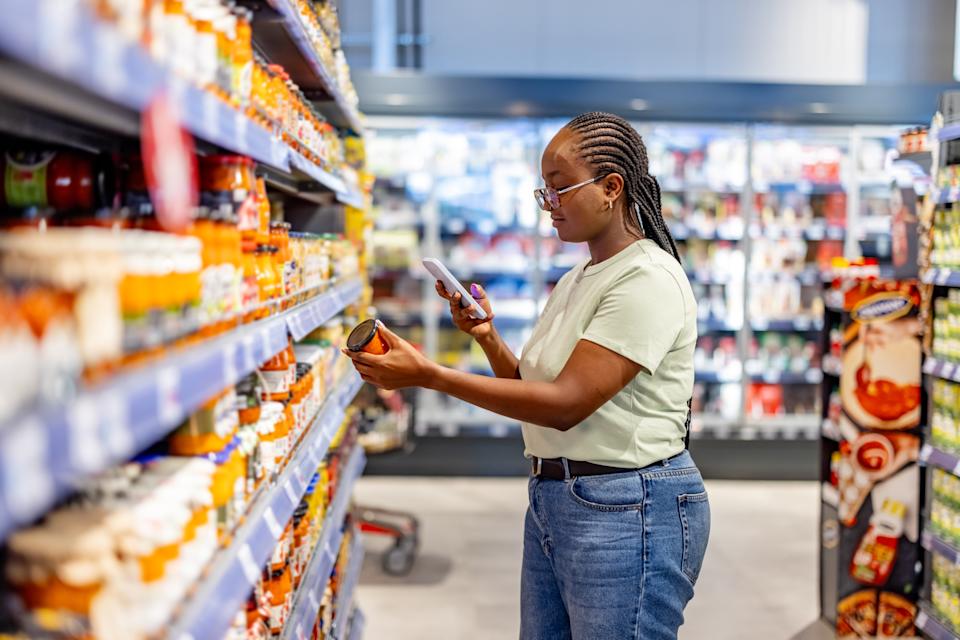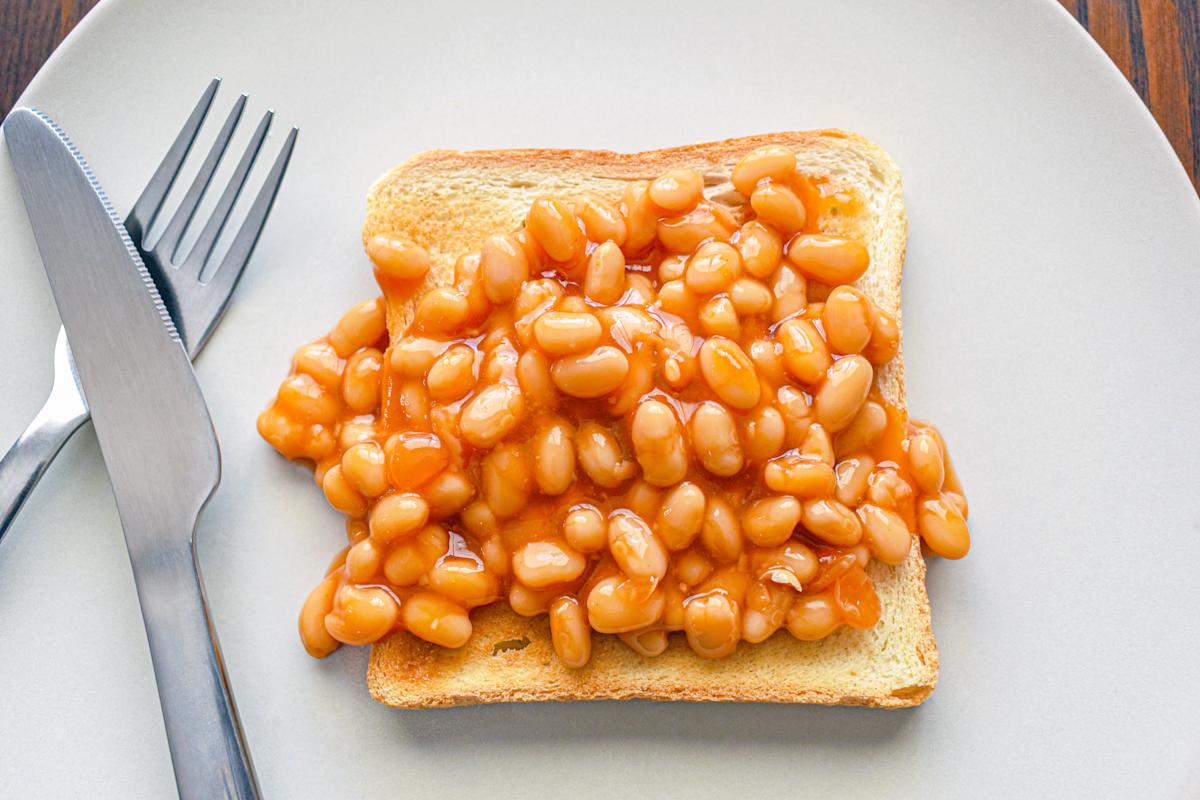They might have originated in the US, but us Brits can’t get enough of baked beans. Whether on toast, in a jacket potato or stirred into a chilli, we eat an estimated two million cans of the tomatoey legumes every day.
They’re handy to have in the cupboard ‘just in case’, are popular with children and their long shelf life and all-round convenience mean they’re an easy option for breakfast, lunch or dinner. With many supermarket-own beans costing around 40p for 400g, they’re cheap, too.
Baked beans are typically made using haricot beans, a small white bean sometimes known as a navy bean. This makes them a good source of fibre and protein, with an 80g portion (approximately three heaped tablespoons) counting as one of your five a day.
But baked beans, which include tomato sauce, spices and flavourings, are also a source of sugar and salt and, as they contain ingredients like modified maize starch, a thickening agent, they’re classed as an ultra-processed food (UPF).
So, just how healthy are they, how much sugar do they really contain, and how do popular supermarket and branded options compare? Here’s what you need to know.
Are baked beans healthy?
The good news is, baked beans can be a healthy food choice, according to specialist dietitian Nichola Ludlam-Raine, author of How Not to Eat Ultra-Processed. This is especially true when eaten as part of a balanced meal alongside vegetables, eggs and slow-release carbohydrates such as wholemeal bread.
“We have them several times a week as a family as my son loves them, either as a side or with jacket potatoes or toast,” she says.
Technically, baked beans are an ultra-processed food but not all UPFs are created equal. Ludlam-Raine tells Yahoo UK, “they’re still a healthy and nutritious food, unlike many other high in fat, sugar and salt ultra-processed foods (HFSS) like sweets”.
Professor Tim Spector, nutritional scientist and co-founder of the Zoe health app has also given baked beans his seal of approval, saying they’re a “really good source of protein”. Speaking on Abbey Clancy’s Exhibit A podcast last year, he said: “I’m not against people eating baked beans if they pick the one that doesn’t have too much sugar in the sauce.”

Baked beans can get a bad rap but they actually have many nutritional benefits. (Getty Images)
Nutritional benefits of baked beans
-
Baked beans are low in fat (usually less than 1g per half a can) and contain no saturated fat. Saturated fat, which is found in things like fatty meats and biscuits, can raise cholesterol and increase the risk of heart disease.
-
They’re a good source of fibre thanks to the haricot beans, with half a can containing more than 25% of your recommended daily intake. “This supports gut health by feeding our good bacteria and helps manage cholesterol,” says Ludlam-Raine.
-
Beans are also a source of plant-based protein, which Ludlam-Raine says makes them great for vegetarians, vegans, and those looking to cut down on meat.
-
And they provide iron, magnesium, folate and other B vitamins, which we need for energy.

Baked beans are a low sugar, medium salt food. (Getty Images)
Are baked beans high in sugar and salt?
Most brands of baked beans do contain added sugar and salt but it may not be as much as you think, with beans classed as a medium salt, low sugar food.
Medium salt
Although it varies depending on the brand, half a can of baked beans contains around 1.3g of salt, 21% of an adult’s recommended daily 6g intake. This makes them a medium, rather than high salt food.
Eating too much salt can raise your blood pressure, increasing the risk of heart disease and stroke, so it’s good to keep an eye on how much you’re eating.
Low sugar
In the same portion size of baked beans, there are typically around 8-9g of sugar. The NHS says adults should aim for no more than 30g of free sugars a day – those added to food or found naturally in syrups and honey.
However, Ludlam-Raine says not all of the sugar in baked beans is added. “Most of the sugar on the label is naturally occurring from the tomatoes,” she says. “And the colour-coded nutrition label is usually all green with the exception of salt, which is often amber.”
A green sugar rating on the nutritional label indicates something is low in sugars.
What to look for on labels
If you want to make the healthiest choice in the supermarket, Ludlam-Raine advises checking the ingredients list.
“My top tip would be to choose baked beans with the highest percentage of beans and tomatoes – typically 85% in total or more – with the third ingredient often being water,” she says. This means your baked beans will be higher in protein and fibre.
“Choosing those with less sugar and salt is an added bonus,” she adds. “Especially the latter if you suffer from high blood pressure.”
If you want to avoid added sugar and salt completely, you can even make your own using dried beans or those tinned in water.

When checking the label, dietitian Nichola Ludlam-Rayne recomends looking for a high bean and tomato content. (Getty Images)
The amount of sugar and salt in 13 popular baked bean brands
These popular beans are ordered by sugar content – lowest to highest. * indicates those with 85% or more bean and tomato content. Prices and ingredients are subject to change.
*Heinz No Added Sugar Beanz, 415g, £1.40
-
Bean and tomato content: 50% beans, 37% tomatoes
-
Salt: 0.9g per half can
-
Sugars: 3.9g per half can
Sainsbury’s Stamford Street Co. Baked Beans, 400g, 26pM&S Baked Beans, 400g, 55p
-
Bean and tomato content: 49% beans, 33% tomatoes
-
Salt: 1.06g per half can
-
Sugars: 8.2g per half can
Baked Beans by Sainsbury’s, 400g, 40p
-
Bean and tomato content: 51% beans, 33% tomatoes
-
Salt: 1.05g per half can
-
Sugars: 8.5g per half can
Asda Baked Beans in a Rich Tomato Sauce, 410g, 42p
-
Bean and tomato content: 49% beans, 36% tomatoes
-
Salt: 0.96g per half can
-
Sugars: 8.6g per half can
Waitrose Essential Baked Beans, 420g, 55p
-
Bean and tomato content: 52% beans, 20% tomato puree
-
Salt: 0.92g per half can
-
Sugars: 8.7g per half can
*Heinz Beanz, 415g, £1.40
-
Bean and tomato content: 50% beans, 36% tomatoes
-
Salt: 1.3g per half can
-
Sugars: 8.9g per half can
Tesco Stockwell & Co Baked Beans, 420g, 28p
-
Bean and tomato content: 44% beans, 27% tomato puree
-
Salt: 1.13g per half can
-
Sugars: 9.5g per half can
*Branston Baked Beans, 410g, £1
-
Bean and tomato content: 51% beans, 38% tomatoes
-
Salt: 1.24g per half can
-
Sugars: 9.6g per half can
Tesco Baked Beans in Tomato Sauce, 420g, 43p
-
Bean and tomato content: 49% beans, 20% tomato puree
-
Salt: 1.03g per half can
-
Sugars: 9.6g per half can
*Aldi Bramwells Baked Beans, 410g, 41p
-
Bean and tomato content: 50% beans, 35% tomatoes
-
Salt: 1.09g per half can
-
Sugars: 9.8g per half can
Lidl Newgate Baked Beans, 420g, 42p
-
Bean and tomato content: 51% beans, triple concentrated tomato puree (no percentage listed)
-
Salt: 1g per half can
-
Sugars: 9.8g per half can
Morrisons Baked Beans, 410g, 45p
-
Bean and tomato content: 53% beans, 24% tomato puree
-
Salt: 1g per half can
-
Sugars: 10.3g per half can
Read more on nutrition:
